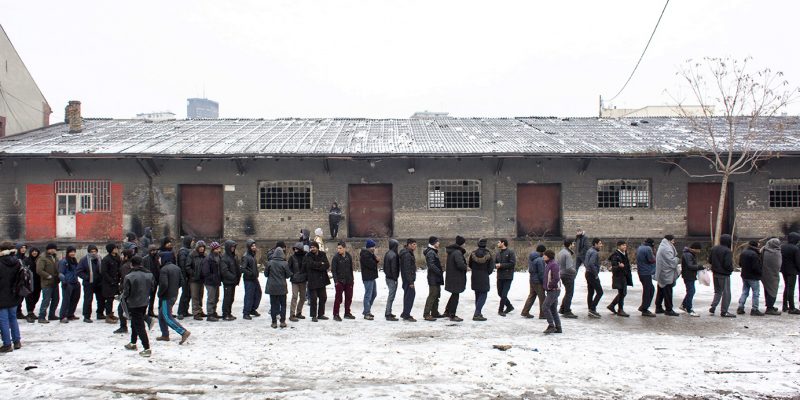1. How Europe is leaving migrants to die out in the snow
They have made it through wars and all kinds of violence only to freeze to death at the doors of Europe. Annalisa Camilli in the Internazionale reports on the dramatic situation of migrants stuck out in the snow in Serbia and Europe’s responsibilities.
2. Belgrade, the white city, is the final border
Eleonora Camilli and Alberta Aureli spoke with Open Migration in words and photographs about what is happening in Belgrade where thousands of refugees are stuck out in the cold without any kind of assistance.
The two reporters also spoke about the situation with Gazebo – have a look here.
Oltre mille migranti bloccati sulla rotta balcanica, a Belgrado, nelle immagini di @EleonoraCamilli e @Albertaureli#gazebowarming pic.twitter.com/fB9teeHaU9
— Gazebo (@welikechopin) January 13, 2017
3. The children who walk without ever stopping
RAI Journalist Valerio Cataldi is another one documenting the drama of those migrants stuck in hellish limbo in Serbia and does so with a unique sense of humanity. Have a look at his report for TG2 on young migrant children who have not lost their smiles in spite of the fact that they have been on the move since the time they were born.
4. Foreign minors alone in Italy
In slippers — that’s how unaccompanied minors are living in Calabria, left to their own devices in run-down centers like the “giant box” in Reggio Calabria. Here is Sara Manisera’s and Arianna Pagani’s report in La Stampa (and here is a link to the one with Open Migration from a few weeks ago).
5. Cuban refugees, Obama and Trump
For decades the United States welcomed refugees fleeing the communist dictatorship of Cuba; beginning in the ‘90s, the policy of welcome was rebaptised “wetfoot, dryfoot” (referring to the fact that those Cubans who managed to reach American shores were allowed to stay while those found at sea were sent back). All of this changed suddenly last week when outgoing US President Obama revoked Cubans’ special status and announced that, from now on, they would be treated like all other migrants.
This is a frightening message to those who want to leave their country, Ilya Somin writes in the Washington Post. But it is also an important step forward in the normalisation of relations between the United States and Cuba, not to mention a true act of challenging Trump who will now find himself in the difficult position of having to decide whether to accept such a normalisation of relations with long-hated Cuba as well as reconsider his promise to close the borders and turn away all migrants. Here is an analysis from Politico that is well worth reading.
6. The ghost boat, and all the others
A bit belatedly we’d like to point out the final installment related to the Ghost Boat investigation, which has tried to tell the stories of at least 243 people – almost all Eritrean migrants – who disappeared without a trace in the Mediterranean along with their so-called “ghost boat”. The final installment, which also offers an important reflection on that never-ending nightmare of deaths at sea, is very much worth reading.
7. Ever more Nigerian women the victims of trafficking and forced prostitution
According to statistics from the IOM, the phenomenon of the trafficking and forced prostitution of Nigerian women in Italy is growing at an alarming rate. More than 12,000 women arrived in Italy last year, 80% of which reportedly in the hands of traffickers. An article in Quartz and one in the Guardian.
8. How to tell the crisis of refugees in photographs
In the Internazionale: four different photographers view the refugee crisis in Europe and reflect on how to tell the story in images.
9. A new strategy for confronting the humanitarian emergency
Thousands of people die on their desperate voyages of hope — those world leaders getting ready to meet in Davos must commit themselves to adopting new strategies to stop this massacre. An editorial in the Guardian by William Lacy Swing, director of the International Organization for Migration (IOM).
10. It’s 2017: migration is the norm – let’s move the debate forward
An editorial by Marta Foresti, director of the Overseas Development Institute (ODI), explaining in an exemplary fashion why in 2017 it is time to accept the fact that migration is the norm and to move the debate forward.
Header photo: migrants in the snow in Belgrade, Serbia – Alberta Aureli.
Translation: Alexander Booth.









